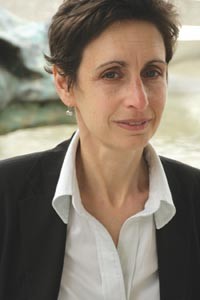After a generation of talk about global warming, 2007 was the year concern about climate change finally went mainstream. A big reason was Al Gore's Nobel Peace Prize and Oscar-winning An Inconvenient Truth. But an earlier piece of stellar reporting was 2006's Field Notes From A Catastrophe: Man, Nature, and Climate Change, by Elizabeth Kolbert, based on her acclaimed three-part series for The New Yorker, where she's a staff writer. Kolbert continues stalking the ongoing catastrophe, with its promise of both droughts and rising waters, along with our tardy, slow-moving efforts to reduce the emissions that cause it. She speaks here March 3 as part of the Drue Heinz Lecture Series. She spoke with CP from her home in Massachusetts. (Click here to hear an excerpt from the interview.)
What's changed about the climate since Field Notes was published?
A lot. When the paperback came out [a year ago], I added an afterword about some of the data that had already become out of date, and that's just continued to happen. Arctic sea ice reached a new record minimum in the fall of 2007, and the Greenland [glacier] melt reached a new record maximum. The data that's been coming in has been always on the very high end -- in many cases, in the very high end -- of what people had predicted. In the community of researchers, there's just a huge level of anxiety about what we're doing, and very little "Well, maybe things won't be as bad as we thought" anymore. They tell you, "Maybe we've just been way way too conservative."
Yet in the U.S., we've done little to address the problem.
I think you could say "nothing."
How urgent is this?
The point that people misunderstand [is], there's no "point" by which you have to act. We may be beyond the point at which we have to act, to be really frank about it. But what happens is, if you keep building more infrastructure, and you know that a [greenhouse-gas-emitting] power plant lasts for 50 to a hundred years, you are just guaranteeing disaster.
John Holdren, who is the head of the American Association for the Advancement of Science, very very smart guy, has this line, "Don't talk about the 'danger zone' in the future. We are in the danger zone." We are in the business of minimizing risk. We are not doing that.
Why aren't we?
The really incredibly dangerous thing about climate change is the time lag in the system -- the time it takes for the climate to react to the greenhouse gas that you already have. Let's say, 50 years. If we were to hold greenhouse-gas levels constant to these levels, it would take us 50 years to reach a new equilibrium. And we would continue to warm up in that period.
It sounds like Jared Diamond's book Collapse: "Those dumb Easter Islanders -- why did they keep deforesting their land?"
One of the guys who discovered the ozone hole [said], "What is the point of having all this predictive science if we ignore the predictions?"
Would some disasters get us moving?
If people are going to sit around and wait for that, then we're definitely sunk. The warming that we see now is really on the tip of the proverbial iceberg of what we've already set in motion.
How much damage has eight years of Bush done?
Incalculable, I think. It's just fed into this whole notion which Americans would prefer to have, that we really don't need to do anything. We have wasted these eight years, and that's really way worse than having wasted eight years, if that makes sense.
Is Europe doing better?
They are. And they will meet their Kyoto [Protocol on climate change] targets, many of them.
Is Kyoto enough?
Kyoto was always a first step, and it was a way to get certain frameworks in place. It was like a warm-up round. And we [the U.S.] didn't participate in the warm-up round. That's absolutely outrageous: the country that's perhaps until very very recently produced the most CO2, and [is] certainly way way out there per capita. As the Europeans have held their emissions down, or at least steady, we have grown. Since Kyoto, we've grown by 15 percent. That means to get back to Kyoto, we have to [shrink] by 15 percent.
How can we tell China and India to reduce emissions when we're still pigging out?
We signed this thing called the Framework Convention on Climate Change, in Rio back in 1992. And that laid out this notion of common but differentiated responsibilities. It meant that the developed world was going to go first, and then the developing. Many people are thinking about what kind of commitment the Chinese could make for the next round of international negotiations. The Chinese are certainly not going to do anything without the U.S. doing something dramatic.
To save energy, some suggest adopting more regionally based economies.
If we're gonna solve this in the context of a market economy, then we're going to have to give market signals. We're gonna make certain things more expensive, and we're gonna make certain things cheaper. And would you then naturally realign along more local lines? Quite possibly.
But can a market economy even be sustainable?
That is the question of our time. And unfortunately we're going to find out.
Elizabeth Kolbert at the Drue Heinz Lectures 7:30 p.m. Mon., March 3. Carnegie Lecture Hall, 4400 Forbes Ave., Oakland. $23. 412-622-8866















